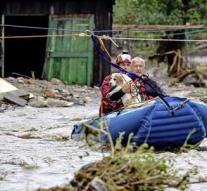

Severe Weather Hits Europe: Why Czechia, Austria, and Poland Are Facing the Brunt
amsterdam - Severe weather is causing havoc in Europe, with Czechia, Austria, and Poland bearing the brunt. Storm Boris's effects are devastating, with significant rainfall and flooding. Experts explain the collision of cold and warm air masses leading to prolonged rain.
Prior to the first drop of rain, red weather warnings had already been issued. Czechia and large parts of Austria are painted red on Meteo-alarm. Storm Boris's consequences seem overwhelming, with multiple deaths occurring despite advance warning of severe weather.
"The water simply has nowhere to go," says storm chaser Wouter van Bernebeek, a meteorologist at Infoplaza. "The situation has arisen due to a collision of cold air from the west and warm air from the east, creating a trapped low-pressure area." This setup can sustain rainfall for days.
Despite the accuracy of modern weather forecasts, predicting the exact outcomes of such severe weather remains challenging. "It's difficult to determine in advance which villages need to be evacuated," explains Van Bernebeek. "Evacuating the entire Czechia is not feasible."
Romanian President Klaus Iohannis writes on Facebook that the country is once again facing the repercussions of climate change. According to Van Bernebeek, this is partly true: "It doesn't mean that these kinds of disasters occur more frequently now, but when they do, the intensity of rainfall is higher."
Bart Verheggen, a climate scientist at KNMI, elaborates that warm air holds more moisture than cold air. "Warm air acts like a sponge that can retain more water. When squeezed, more rain falls. The air mass over Eastern Europe originates from the Mediterranean Sea, currently warmer than usual, making the air extra humid."
Verheggen and Van Bernebeek point out the heavy rainfall in Limburg, Belgium, and Germany in 2021 as a similar scenario. "No fatalities occurred in the Netherlands then, but did in Belgium and Germany, partly due to the elevation difference in the Ardennes," says Verheggen. "Mountains act as funnels for water, a problem we don't have in our flat country."
In the short term, the storm's impacts could not have been prevented, according to the KNMI scientist. "In the Netherlands, we have designated space for rivers to flood in a controlled manner, something that cannot be achieved in three days."
Verheggen's message is clear: "Extreme precipitation is one of the clearest signs of climate change," he says, "the only way to prevent it from worsening is to rapidly reduce CO2 emissions."
In Austria, as much rain fell in four days as typically in the entire month of September, reports the Austrian weather institute Geosphere. Lower Austria, in particular, suffered severely with around 350 liters of rain per square meter. Streets in Vienna were also flooded, leading to house evacuations. A firefighter lost his life during a rescue operation.
In Romania, dozens had to be rescued from their homes. At least four individuals lost their lives and were found during rescue operations in the Galathi area.
In Czechia, a quarter of a million households are without power on Sunday due to trees falling on power lines. A hospital in Brno was evacuated, and the Olza River on the Polish border is at risk of flooding. Czech Prime Minister Petr Fiala emphasizes the need for crisis management and safeguarding human lives and properties.
Polish Prime Minister Donald Tusk stated in a press conference that 1600 individuals had already been evacuated in Klodzko municipality. Thousands of households are without power and mobile connections. The region saw around 200 millimeters of rain, causing disruption. In Glucholazy, the mayor initiated evacuations when the local river overflowed. "We are ensuring everyone's safety, whether they like it or not."


Leave a comment